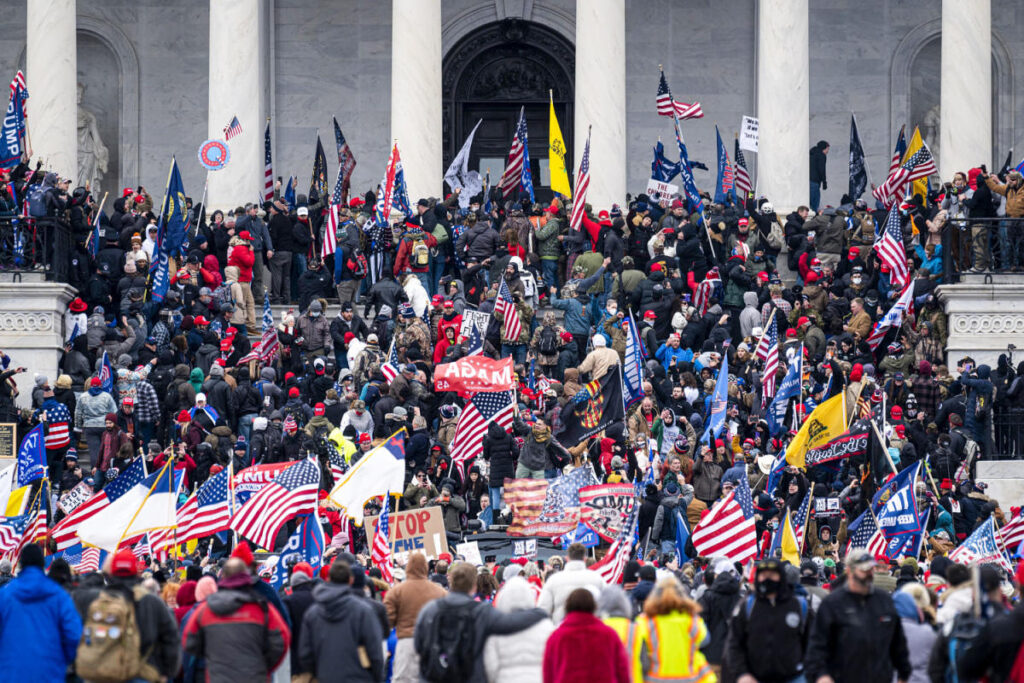In a federal courtroom in Washington, a supporter of Donald Trump named Troy Weeks was sentenced for his involvement in the January 6, 2021 Capitol insurrection. Weeks, 38, appeared visibly emotional as he discussed his difficult childhood and expressed remorse for his actions, which included assaulting law enforcement during the riots. He pleaded guilty to two felonies—specifically, assaulting officers and resisting arrest—along with several misdemeanors, resulting in a 21-month prison sentence. The presiding judge characterized his actions as a “direct attack on the nation’s democracy,” while prosecutors highlighted Weeks’ encouragement of others to assault police and his attempts to seize law enforcement equipment, emphasizing the chaos he helped to propagate.
Weeks’ sentencing came amid ongoing repercussions for various individuals involved in the Capitol attack. For instance, Edward Kelley, another rioter charged with plotting murder against FBI agents investigating him for his January 6 actions, was tried in his Capitol case, where it was revealed he was armed during the riot. His co-defendant has already confessed to the murder plot aimed at federal employees. Additionally, arrests continued with individuals like Robert Piccirillo, the Proud Boys chapter president, and a father-son duo, Richard and Keith Andrews, being charged for their roles in the January 6 violence, underscoring the continuing legal fallout from that day.
Recent arrests have included others such as David Joynt, who participated in the assault against officers, and Joseph Adams, who was seen attacking law enforcement with a flagpole. These incidents emphasize that the FBI is still actively pursuing those involved in the riots. Many of the arrested individuals are awaiting trials or facing legal proceedings, revealing the extensive legal actions taken against over 1,500 individuals connected to January 6. Moreover, federal prosecutors have made significant progress in obtaining over 1,100 convictions, reflecting the severity with which the government views the events surrounding the Capitol invasion.
In the broader context of the January 6 investigation, the upcoming 2024 election holds potential consequences for the future of these cases, especially with Trump’s promises to pardon insurrectionists if re-elected. Trump has described the rioters as political prisoners and has expressed his intent to evaluate cases for potential pardons on an individual basis. This rhetoric resonates with many supporters who view the actions of the rioters as righteous causes, while opponents fear it could embolden further violence and undermine the legal process.
The violent events of January 6 resulted in serious injuries to over 140 law enforcement officers and claimed several lives. Many of the arrested individuals were recorded using an array of weapons and objects during the riots, leading a judge involved in these trials to criticize attempts to justify the rioters’ actions as reflective of patriotism. Concerns have arisen that loyalty to Trump and the narrative surrounding the Capitol attack has created a distorted perception of those involved in the assault, which could potentially lead to further unrest.
Amid this legal and political turmoil, Troy Weeks noted in his comments that a disconnect exists in the perception of governance within the country, echoing sentiments that many Americans feel their leadership does not represent them. His reflection on time being the ultimate testament of personal learning and growth suggests a recognition of the need for accountability and redemption among those who participated in the insurrection. As these legal proceedings continue and the political landscape shifts, the narrative surrounding the events of January 6 remains a focal point in American discourse, shaping the future of both accountability and political ideology.

